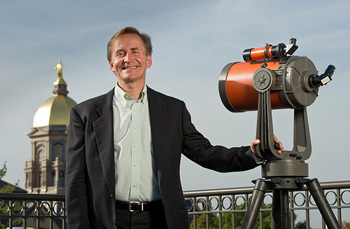
Peter Garnavich, professor and chair of the Department of Physics, was awarded a NASA Silver Achievement Award as part of a team that developed an anonymous proposal system that led to an increased number of women and younger researchers who successfully landed research time on the Hubble Space Telescope.
The proposal process for doing research using the Hubble Space Telescope is competitive, with only about 200 accepted out of over 1,000 proposals each year. A study performed by the Hubble team had previously shown that success rate for proposals led by female principle investigators was less than the success rate by male principle investigators.The team, called the Working Group for Anonymizing Proposal Reviews, was led by Kenneth Sembach, director of the Space Telescope Science Institute (STScI), and consisted of eight members outside of NASA and five at STScI who developed procedures that would assure the process was “dual” anonymous—meaning reviewers did not know who submitted proposals, and proposers did not know who the reviewers were.
The results of the new process were significant: In 2018, for the first time in 18 years, Hubble proposals from women had a higher success rate than those by men. Additionally, more new investigators than in the past were awarded time on the telescope.
“One of my goals was not just diversity of scientists, but diversity of ideas,” Garnavich said. “What happened in the past was when you know who submitted the proposal, you have an idea whether they’re “good” or not before the review, and it’s a crutch when deciding on the quality of the proposal.
“With a dual-anonymous peer review you really have to read the proposal and understand the science without relying on that crutch.”
The process is now being adapted to other areas within NASA, he said. It is already used widely across Europe and will be applied to proposals for the James Webb Space Telescope due to launch next year.
However, the change was not without opposition. Garnavich and other members each received calls from well-established colleagues describing why they believed the idea was bad for science from Hubble. Without Sembach’s leadership, the project could have folded under the pressure from some established astronomers, Garnavich said, so he respected that Sembach moved forward with it.
“Having an even chance to have your proposal be selected with everyone else is the most positive part of the change in the system,” Garnavich said. “I’m always impressed when leadership happens: knowing what the right thing to do is, and pushing ahead in the face of powerful opposition.”
Originally published by at science.nd.edu on October 30, 2020.